From the Archives
By Mary Woodward
JACKSON – When I was in the eighth grade at Bailey Junior High in Jackson, this is what I was taught in American History class about the cause of the Civil War: The people of the South enjoyed importing shoes from France as they liked nice shoes. Massachusetts was home to a large shoe-making industry and wanted to sell shoes in the southern market. To force southerners to buy Massachusetts-made shoes, the government imposed high tariffs on imports from France. This angered southerners; so southern states seceded from the United States and formed the Confederacy.
There was never any mention that slavery was the cause of the Civil War. Even though all the key leaders in the South continually based their secession on maintaining the way of life in the South with slavery at the forefront, our eighth-grade class was taught that it was about shoes.
At the same time (1978-80), we were being taught this “white-washed” version of history, a controversial new textbook was being written and proposed for use as a textbook for ninth grade Mississippi History curriculum. “Mississippi: Conflict and Change,” edited by James Loewen of Tougaloo College and Charles Sallis of Millsaps College, gave a clear history of the state, especially in addressing difficult subjects such as slavery and lynchings. The textbook was not accepted for use in Mississippi school curriculum due largely in part to a graphic photograph of the lynching of a black man.
This reflects how history can be manipulated systemically to make it more palatable, especially considering at that time 97% of Bailey’s students were black. By rejecting the tough history in Conflict and Change, the board of education continued to present softened history to students throughout the state.
Having prefaced with 20th century education, let us journey back to 19th century Natchez education. Last issue we discussed early efforts by Bishop John Joseph Chanche and Bishop William Henry Elder to educate slave children in the afternoons in the rectory in Natchez. We continue that theme this week as we journey through the Civil War and into post war education efforts and the establishment of a school.
The custom of having slave children attend catechism classes in buildings on the church grounds continued throughout the Civil War. After the Emancipation Proclamation was given by President Lincoln in 1863 at Gettysburg, several thousand slaves, now emancipated by the proclamation, gathered in and around Natchez since it was occupied by Union troops.
We find the following letter from Bishop Elder to the Propagation of the Faith Society from early 1864 addressing the conditions in Natchez:
The proclamation of liberty caused several thousands of Negroes to gather in and around Natchez. And, although the military authorities provided them as well they could with shelter and food, yet great numbers of them sickened and died – and they are still dying every day. Almost all that we could get an opportunity to see were well disposed to receive the teachings of the Church and glad to be baptized, and we have been occupied, sometimes one and sometimes three of us, a part of almost every day, preparing them for death. Personally, I had the happiness of baptizing more than five hundred during the sickly period last fall.
After the war in 1868, Msgr. Mathurin Grignon, who had arrived in Natchez from France at the end of Bishop Chanche’s tenure as bishop, and was now Vicar General of the diocese, began a school in the church basement for Catholic children who were former slaves. According to “Cradle Days of St.

Mary’s,” Msgr. Grignon taught catechism to the children and hired teachers for other subjects. In 1868, he established the Society of the Holy Family to help support the poor among the Black Catholic community in Natchez.
Hoping to fortify the school with Sisters as teachers, Bishop Elder wrote to the Oblate Sisters of Providence in 1873 promising a house for the Sisters and a playground close by for the children to play. The Oblates were unable to fulfill Bishop Elder’s request however and the school enrollment dwindled.
A description of the school in 1878 is included in “Cradle Days” as: The basement of the Cathedral was divided into two large rooms. The one nearer Union street was vacant; the other was used as the schoolroom. The teacher in 1878 was a Mrs. Sarah Daigle, whose piety made quite a profound impression upon the children. … When Mrs. Daigle fell into ill health, the account continues: the school was moved from the basement of the church to the brick building just south of the Bishop’s Residence. This school was taught by Miss Beauvais and then for a short time by Miss Hammond.

When Bishop Elder was named Archbishop of Cincinnati in 1880, Bishop Francis Janssens was appointed the new bishop for Natchez. He, too, was committed to providing a school for Natchez’s Black Catholic community. Enrollment in the early 1880s was 25 students.
Bishop Janssens arranged for the Sisters of Charity, who were staffing St. Joseph School for white girls, to teach in the school. Here is a quote from his diary dated Oct. 4, 1886: Today, the Colored School was opened by the Sisters of Charity in the lower room of the house next to our residence. The number of pupils the first day was 24. Sister Mary Elizabeth and Sister Louise were the teachers.
By the end of 1886, the enrollment was up to 15 boys and 35 girls. The school was named St. Francis. In 1887, the school was flourishing with 65 students. The building had to be adjusted to fit all the students. A room on the second floor of the building became a classroom for the older girls.
The evolution of education for Black Catholics in Natchez from the establishment of the diocese, through the Civil War and into the 1880s does reflect a dedication on the part of the early bishops and pastors to evangelize in this community. As we move forward in exploring this ministry, we will see it evolve even further as a parish is established in Natchez for African Americans in 1890 under Bishop Thomas Heslin.
(Mary Woodward is Chancellor and Archivist for the Diocese of Jackson)








